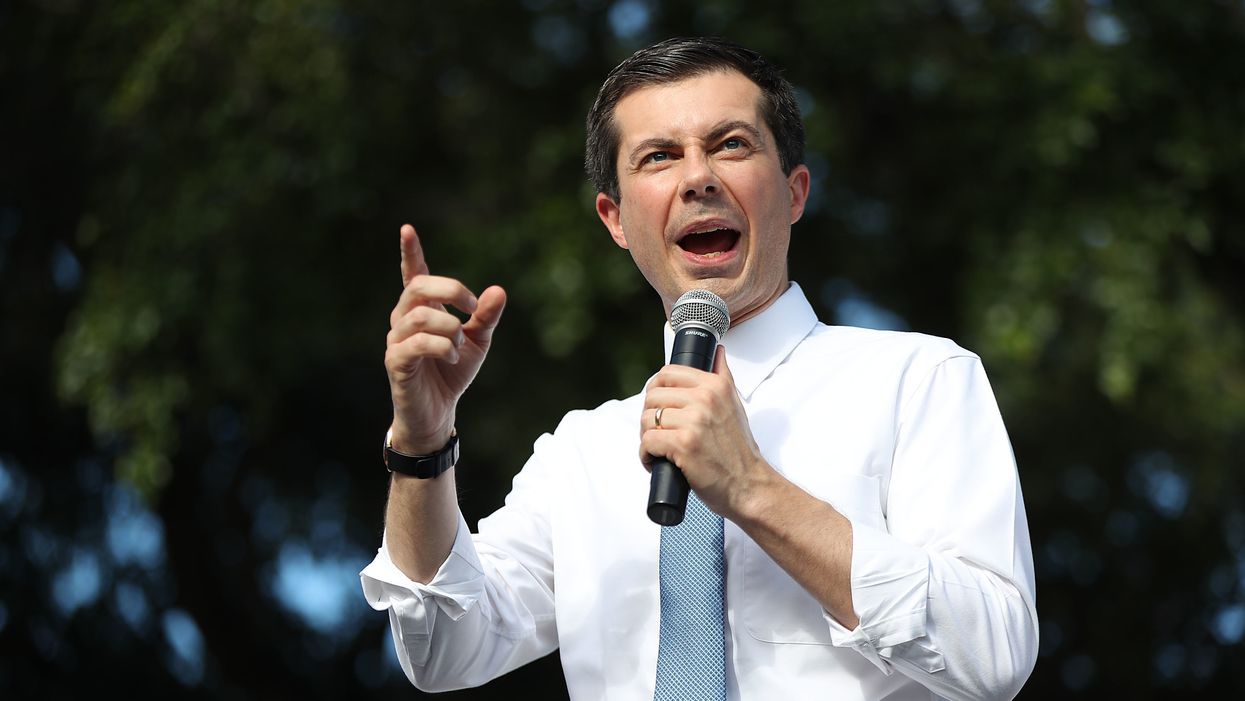This story has been revised after additional reporting.
Seven of the 20 presidential candidates debating this week, but only two of the group polling in the top tier, have vowed to make revamping the political system and boosting government ethics their first legislative priority if elected president.
The seven made that commitment by signing the "Reform First" pledge drafted by End Citizens United, an advocacy group that is mainly interested in shrinking big money's sway over campaigns and governing. It announced the signatories on Monday.
Sen. Elizabeth Warren, who is currently third in the average of surveys of Democratic voters, and Mayor Pete Buttigieg of South Bend, Ind., who ranks fifth, have signed the pledge. He turns out to be the only candidate who is unambiguously in favor of 17 of the most prominent proposals for fixing the political system, according to a comprehensive review by The Fulcrum of all the candidates' stances. Many of those proposals are the sorts of things End Citizens United wants to see in legislation moving in 2021.
But Warren and her Senate colleague Kirsten Gillibrand of New York, who also signed the vow, are only a small notch behind Buttigieg in their fealty to the top items on the democracy reformer agenda. Both back 16 proposals unequivocally and say they're open to remaking the Supreme Court, without being solidly on board any specific plan.
The other signatories are Sen. Michael Bennet of Colorado, Sen. Amy Klobuchar of Minnesota, Gov. Steve Bullock of Montana and former Rep. Beto O'Rourke of Texas. All of them are polling at an average of 2 percent or less.
The pledge was sent to all presidential candidates asking them to make "comprehensive anti-corruption, money-in-politics, and voting rights reform legislation that is similar to or builds upon the For the People Act, the very first bill you send to Congress." The For the People Act, also known as HR 1, is the the sweeping campaign finance, election administration and ethics overhaul passed on a party-line vote by the House in March but shelved indefinitely by the Senate GOP leadership.
End Citizens United said it plans to encourage voters to make contributions to the seven candidates as well as promote their campaigns on social media. While that's not the same as an endorsement, the help with money and exposure could provide the praised candidates with an important boost.
The organization has quickly become a power player behind Democratic causes. It spent more than $12 million supporting Democrats running for Congress or opposing Republicans on the ballot in 2018, making it one of the largest outside spenders during the midterm campaign, according to the Center for Responsive Politics. The group now boasts 4 million members and says more than half a million have been campaign donors.
"Committing to reform first shows the American people you're serious about cleaning up corruption," said Tiffany Muller, president of the organization. "These candidates uniquely understand that reform is the essential first step to accomplishing the progressive change that America needs."
In a statement to End Citizens United, Warren said she planned to rein in corporate special interests that block the will of the people. "The first thing I would do as president is pass my anti-corruption bill to make our economy, government, and democracy work for everyone," she said.
Buttigieg expressed a similar sentiment. "We need bold and deep reforms to fix our broken political system, which is why as President I will make democratic reform my day-one priority," he said in his own statement.
Gillibrand and Klobuchar also flatly support — or say they are open to supporting — each of the 17 leading proposals, which cover campaign finance, voting rights, access to the ballot box, government ethics and changing institutions that include the Supreme Court, the Electoral College and the political gerrymanderingsystem.
"As president, I'll continue taking Washington's corruption and greed head-on by making democracy reform one of my first priorities," Gillibrand said.
Klobuchar said the country needed sweeping anti-corruption and voting rights reform. "As President, it will be the first bill I send to Congress," she said.
Of the 17 proposals, Bennet only opposes changing the makeup of the Supreme Court. "Until we fix our broken politics, we will keep struggling to make progress on the issues Americans care most about — from health care to climate change to gun violence," he said.
O'Rourke hasn't taken a position on presidential candidates releasing their tax returns, but he released his own returns as part of his primary bid. "In order to overcome the greatest challenges we face, we must first fix our democracy and return power to people," he said.
Bullock supports campaign finance reforms but opposes new restrictions on the revolving door. "Taking on the corrupting influence of money in politics is the fight of our time — and it's been the fight of my career," Bullock said.



















